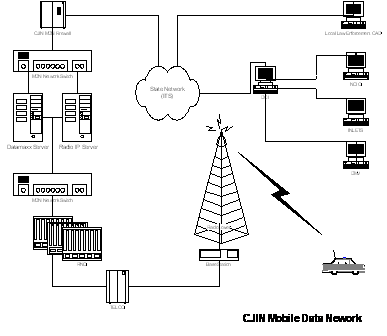CJIN Mobile Data Network

Description
Public safety agencies across North Carolina depend on their communication systems as a “life line” for support and individual officer safety. Incompatible radio and data communications equipment inhibits interagency communications in routine and emergency situations. The CJIN – Mobile Data Network (CJIN-MDN) is focused on maintaining the “backbone” of a statewide, shared, public safety mobile data network consistent with the goals and objectives of the North Carolina Criminal Justice Information Network.

Benefits
The CJIN-MDN makes available mobile data service to all public safety agencies in North Carolina including federal, state and local agencies. This service allows smaller departments with limited financial resources to have the same assets to fight crime and provide officer safety as the larger departments have.
Project Status
CJIN-MDN was a five-phase project that began in 1996 and concluded in 2002. Phase V completed coverage for the State’s approximate 48,000 square miles. The current focus of CJIN-MDN is on optimizing coverage, replacing aging base stations, exploring and evaluating new applications, and supporting and maintaining CJIN-MDN deployed infrastructure. Additionally, we will be exploring viable options for the next generation of Public Safety grade wireless data services. Motorola, the MDN system equipment provider, has announced “end-of-life” for all the CJIN-MDN infrastructure and subscriber equipment. A funding source for the maintenance of aging equipment and/or next generation equipment has not been identified.
Description of Data
Vehicle registration (car and boat), driver’s license, state & national wanted persons, securities (could be stolen traveler checks), stolen articles (TV, VCR, etc.), stolen guns, concealed carry permits, missing persons, domestic violence orders, sexual offender registration violations, and messaging. Agencies with Computer Aided Dispatch (CAD) and Records Management Systems (RMS) have the ability to send reports and dispatch cars via the network. Authorized members have the ability to transmit citations directly to the Administrative Office of the Courts and a few CJIN partners are testing in-vehicle facial image recognition software. Users performing general inquiries on drivers and registration enjoy a twelve second response time.
Lead State Agency Responsible for Project: Department of Crime Control and Public Safety (DCC & PS), State Highway Patrol (SHP).

